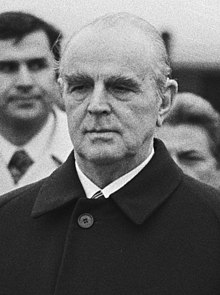
Back قسطنطين كرامنليس Arabic قسطنطين كرامنليس ARZ Constantinos Karamanlís AST Канстанцінас Караманліс Byelorussian Константинос Георгиу Караманлис Bulgarian Konstandinos Karamanlís Catalan Konstantínos Karamanlís Czech Konstantinos Karamanlis Danish Konstantinos Karamanlis German Κωνσταντίνος Καραμανλής Greek
Konstantinos Karamanlis | |
|---|---|
| Κωσταντίνος Καραμανλής | |
 Karamanlis in 1978 | |
| President of Greece | |
| In office 5 May 1990 – 10 March 1995 | |
| Prime Minister | |
| Preceded by | Christos Sartzetakis |
| Succeeded by | Konstantinos Stephanopoulos |
| In office 10 May 1980 – 10 March 1985 | |
| Prime Minister | |
| Preceded by | Konstantinos Tsatsos |
| Succeeded by | Ioannis Alevras (Acting) |
| Prime Minister of Greece | |
| In office 24 July 1974 – 10 May 1980 | |
| President | |
| Deputy | Georgios Mavros |
| Preceded by | Adamantios Androutsopoulos |
| Succeeded by | Georgios Rallis |
| In office 4 November 1961 – 17 June 1963 | |
| Monarch | Paul |
| Preceded by | Konstantinos Dovas |
| Succeeded by | Panagiotis Pipinelis |
| In office 17 May 1958 – 20 September 1961 | |
| Monarch | Paul |
| Preceded by | Konstantinos Georgakopoulos |
| Succeeded by | Konstantinos Dovas |
| In office 6 October 1955 – 5 March 1958 | |
| Monarch | Paul |
| Preceded by | Alexander Papagos |
| Succeeded by | Konstantinos Georgakopoulos |
| Personal details | |
| Born | 8 March 1907 Küpköy, Salonica Vilayet, Ottoman Empire (now Proti, Greece) |
| Died | 23 April 1998 (aged 91) Athens, Greece |
| Resting place | Konstantinos Karamanlis Foundation Headquarters, Philothei, Athens |
| Political party | People's Party (1936–1951) Greek Rally (1951–1955) National Radical Union (1955–1963) New Democracy (1974–1998) |
| Spouse |
Amalia Kanellopoulou
(m. 1951; div. 1972) |
| Relations |
|
| Alma mater | University of Athens |
| Signature |  |
Konstantinos G. Karamanlis (Greek: Κωνσταντίνος Γ. Καραμανλής,[1] pronounced [konstaˈdinos karamanˈlis]; 8 March 1907 – 23 April 1998), commonly anglicised to Constantine Karamanlis or just Caramanlis, was a four-time Prime Minister of Greece and two-term president of the Third Hellenic Republic. A towering figure of Greek politics, his political career spanned portions of seven decades, covering much of the latter half of the 20th century.[2]
Born near Serres in Macedonia, Karamanlis practiced law until his election to the Hellenic Parliament in 1936 as a member of the conservative People's Party. Rising through the ranks of Greek politics after World War II, Karamanlis became Minister of Labour in 1947, and in 1951 he was named Minister for Public Works in Alexandros Papagos's Greek Rally administration. He was appointed prime minister by King Paul of Greece after Papagos's death in 1955. During his first term, he applied a program of rapid industrialization, heavy investment on infrastructure and improvement on agricultural production, which led to the post-war Greek economic miracle. He also implemented the extension of full voting rights to women, which had stood dormant since 1952. In foreign affairs, he pursued an aggressive policy toward Greek membership in the European Economic Community (EEC), and abandoned the government's previous strategic goal for enosis (the unification of Greece and Cyprus) in favour of Cypriot independence.
In 1963, Karamanlis resigned following a disagreement with King Paul amidst spiralling political crises in Greece. He spent the next eleven years in self-imposed exile in Paris, while the country fell under military dictatorship after the 1967 coup d'état. After the fall of the junta in 1974, Karamanlis was recalled to Athens to assume interim premiership. This period, known as the Metapolitefsi, saw the country's transition to a pluralist democracy. His new party, New Democracy, won a commanding victory in the November 1974 elections, which were followed by a plebiscite that abolished the monarchy and established the Third Hellenic Republic. In 1980, Karamanlis resigned as prime minister and was elected President of the Republic. In 1981, he oversaw Greece's formal entry into the European Economic Community. He resigned from the presidency in 1985 but was again elected in 1990, and served until his retirement from active politics in 1995. Karamanlis died in 1998 at the age of 91.
- ^ "Karamanlis Foundation".
- ^ David Wilsford, ed. Political leaders of contemporary Western Europe: a biographical dictionary (Greenwood, 1995) pp 217–223
© MMXXIII Rich X Search. We shall prevail. All rights reserved. Rich X Search